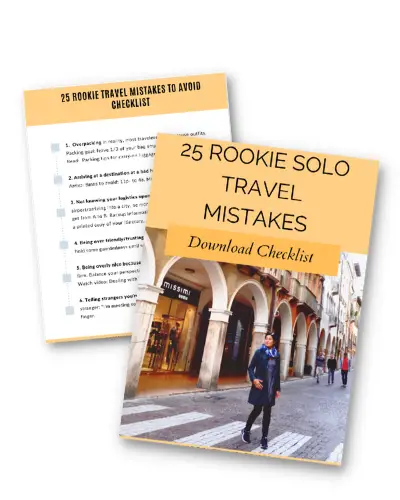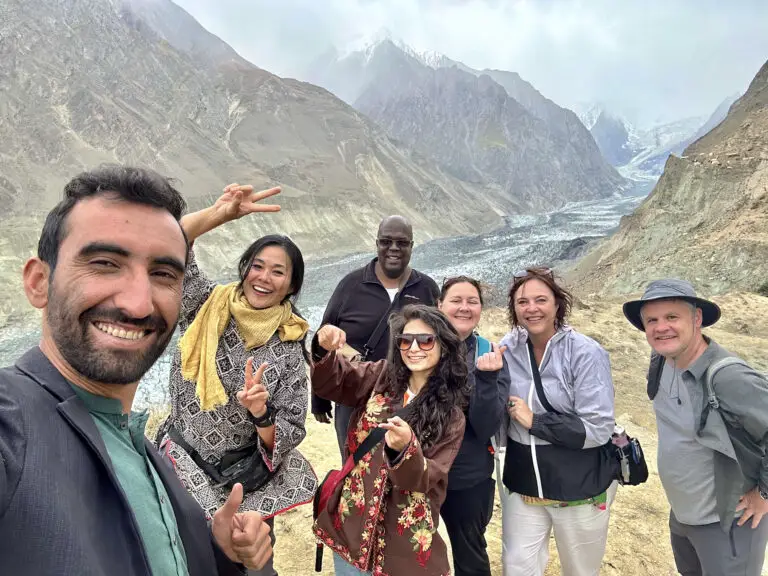Last Updated on January 8, 2024 by Christine Kaaloa
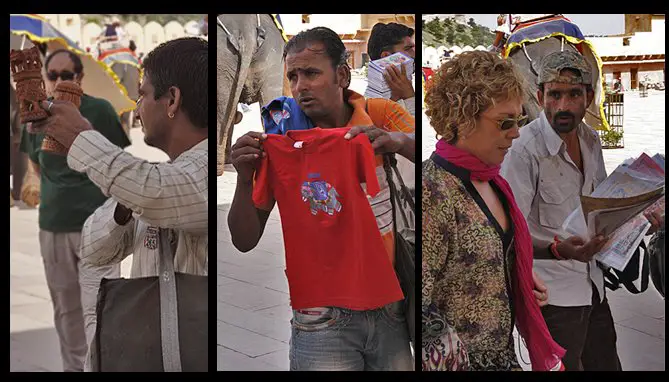
The fear, worries and annoyances of dealing with touts, scams and beggars can feel like a deterrent of travel, especially for women traveling alone. I’ll share ways I deal with these unpleasant encounters.
How to Deal with Touts, Scams, Beggars as a Female Solo Traveler
Table of Contents: How to Deal with Touts, Scams, Beggars!
As a solo traveling woman, I encounter touts, scams and beggars regularly in my travels. It is always uncomfortable to deal with alone. I don’t have a male partner to shield and protect me. Touts and scammers can be persistent and as a female traveling alone, I can make for an easy target. But being forced to deal with them has taught me to define my safety parameters, toughen up, to not automatically trust everything a stranger tells me and to take responsibility for my actions.
Because I will be the one who has to endure its potential consequences.
Most of these undesirables are male. They know to be aggressive, pushy, provoking and expect a woman to be either soft-hearted or vulnerable to their persistence. A woman alone raises can feel lonely, naive, frightened and in search of safety to anyone who offers it up. Men know this and scammers and touts can use this to their advantage.
In Delhi, I had a male scammers attempt to intimidate me out of asking for a tour refund by raising their voice in anger. In Bangkok, I’ve had a taxi driver pretend not to understand what I was saying so as to force a fare hike after my male friend put me in his taxi and gave him explicit instructions. In Morocco, I met fake police officer who offered to guide me out of being lost. I can keep going…
In all cases, I was intimidated and scared shitless, knowing their male physical demeanor could overpower me or lead me into a bad situation. In every case, I felt my gut saying something was not right, I did not show the fear or panic I truly felt, but instead, acted quickly to figure out how to get out of that cornered situation.
Dealing with touts
Touts often come in the form of aggressive salespeople, whether it’s a street or souvenir vendor, a taxi or tuk-tuk driver, tour agents, etc.. Often they want you to buy their product or service and their techniques is to pester you unrelentingly until you buy something. Everyone has to make a living, but it can wear your patience and smile down. Depending upon their ethics or desperation, a small percentage of them may push forward into a scam.It can keep you on your toes. Standout countries for me are Vietnam, Cambodia, India, Morocco, Indonesia, Italy, etc… but touts are common to practically, every country across the globe.
Act confident
Vulnerable and overly kind people can be targets for touts, because they appear to not have willpower. Act confident or fake it, to exude certainty in your walk and body expression.
Avoid giving them your attention
Avoiding eye contact with a tout helps a little as you are not giving them your attention and they can only pursue you so far without being acknowledged. One follower said she wears dark glasses to deflect attention. Other similar tactics is to simply ignore them or pretend you don’t know the language. These are all passive-aggressive, tactics however.
Give a firm “No”
I always give a firm, resolute, confident and low-sounding “No.” Sometimes, I look them in the eye; at other times, I avoid eye contact. Eye contact can be misconstrued as inviting and engaging them into to a more aggressive courtship process.
Many of us, especially women, have been trained to be polite when dismissing something. Sometimes, we give white lies to soften the blow, like “No, maybe tomorrow“…
Never give a ’Maybe’ .
’Maybe’ responses are like a potential “Yes“. It can invite more aggressive behavior so they can convince you to change your mind. In some countries, street vendors may take your word as your promise and will return tomorrow to cash in on your promise. I’ve seen this happen in Vietnam, where Hmong locals in Sapa will wait outside hotels for tourists. Be careful of what you say.
If they persist– I run.
It’s ridiculously effective as an endgame.
Dealing with Tourist scams
The more you travel, you are bound to cross paths with tourist scams. A female solo traveler cannot let her guard down in this regard of safety. The best and most effective way to prevent scams is to know what scams exist in the country before traveling.
Always research possible scams in advance.
If you know about they, you will recognize it’s face when you meet it. Travel bloggers, travel sites, guidebooks have already written about them or do a Google search about scams in the country you’re traveling to. Ask your hotel as they’re likely to deal with tourist issues.
Trust your intuition.
The greatest thing travel has taught me is to trust my intuition. If you have a gut feeling that something is not right about a situation (or what a stranger tells you), trust that feeling.
Travel Insurance
In the case anything happens in robbery, theft or hospitalization, Travel insurance offers peace of mind that your finances are covered. The best travel insurance I’ve used is World Nomads.
Learn from experience
Sometimes, you might learn about them through the actual experience of getting scammed, like I did in Delhi, when my friends and I learned some tuk-tuk drivers take you to counterfeit tourism offices. Or when I almost got caught in a ping-pong show in Bangkok. The list goes on… Even travel bloggers get scammed, due to the fact we travel often and the more you travel, the greater your opportunities to encountering them.
Read: Tips of Dealing with Scams (aka How to Prevent and Get out of them)
Dealing with Beggars
There are many opinions on how to cope with beggars. Each situation can feel different and it’s entirely up to you as to what you feel comfortable with.
Poverty is a global concern and beggars are common, especially in large cities. There are many types of organizations from government to non-profit, that are fighting to teach sustainable living to impoverished communities, get the homeless off streets, bring education to children, fight child trafficking, teach reform, etc… Are you aiding a crutch, getting suckered out of your money or helping a person walk proudly on their own merit?
Do not give monetary handouts
… It could be a scam (where the beggar is working for a boss),
… The beggar can use it to buy drugs or alcohol,
… it strengthens the belief that all travelers are rich (and encourages tourist harassment),
… It makes begging to feel like a lucrative career. Sometimes these are children who do want to go to school or keep someone from getting a real job, going into a homeless shelter, or finding strength/help to improve their life through solid, self-sustainable means.
It makes me a target for something worse
As a female, giving handouts calls attention to me as a lone woman with a generous heart. This could make me a potential target for a scam, mugging or worse if the beggar is working with others.
Decline with respect
I spoke with a social worker once and she said the best thing you can do is look at them in the eye when you say NO. Beggars are an invisible part of society– often they’re seen as ghosts in society. Often, society doesn’t want to acknowledge poverty or deal with it. Thus, recognition can be a powerful exchange, reinforcing them on some level with the feeling that they are equals with us in independence, humanity and self-sustaining potential.
Watch the video version
How to Deal with Touts 01:01
How to Avoid Tourist Scams 02:19
How to Deal with Beggars & Responsible Tourism 05:28
Practicing Responsible Tourism in travel
The more I travel and experience different situations and economic backgrounds, the more I strive to practice responsible tourism. All of it can certainly feel like a gray line and who is to say what is right or wrong. With responsible tourism, I look at the how my choices create an either, positive or negative impact upon the culture. I’m looking at the entire ecosystem of balance.
On an ethical level, rewarding a tout, beggar or scammer’s actions merely encourages them to do it more. Sometimes it rewards criminals, keeps child labor in full force, and creates a larger problem for the community to deal with after a tourist has left. Touts beggars and scammers don’t only target tourists; they target locals, as well. I’ve heard from many disgruntled Bangkok and Indian locals complain how rickshaw drivers and taxis tun on locals, as well. Cheating a tourist out of money gives them more confidence in their success.
Beggars: Some things to think about:
… Giving food. Unless it is wrapped and directly from the store, a beggar could get sick from the food and if it’s in the U.S., they have a right to sue you. Western corporations toss out massive quantities of good food from corporate luncheons rather than feed the homeless- it is for this reason.
… Giving candies to begging children. Sweets can lead to cavities and poverty-stricken families cannot always afford a dentist. Also, when you give candy to one, sometimes it attracts many. Giving pencils- initially, it was probably started by a well-meaning NGO but today, it’s another way of reinforcing begging in a community vs. the merits of rewarded work.
… Give money or milk to begging mothers with babies. A common scam is they will return the milk at the pharmacy they took you to.
— Hire a child as a guide. You can keep them from going to school because it’s lucrative work. Also, in some societies, if they are caught they can go to jail.
–Giving money to begging children. Sometimes, they have mafia handlers, who have known to maim children to raise the pity factor. Other times, a poor family puts their child out to work, and thus, the child never gets to go to school.
— Giving money to a begging adult. Sometimes, it is used for drugs or it keeps that.
Dealing with beggars is a gray area – especially if it is a begging child, a wounded soldier or a senior. It is an ongoing topic with responsible travelers and travel bloggers who are concerned with the negative impact of tourism on a culture, especially in developing countries. If you sincerely want to make a difference, join a volunteer program or donate to a government or organization, that deals with the type of aid you wish to give.
| Recommended Essentials for Solo Travelers. Click to Shop. | |||
 |
 |
 |
 |
Related Posts:
Dealing with Scams in India & Getting out of them
21 Ways : Prevent Pickpockets & Thieves
Travel Tips for Solo Female Travelers
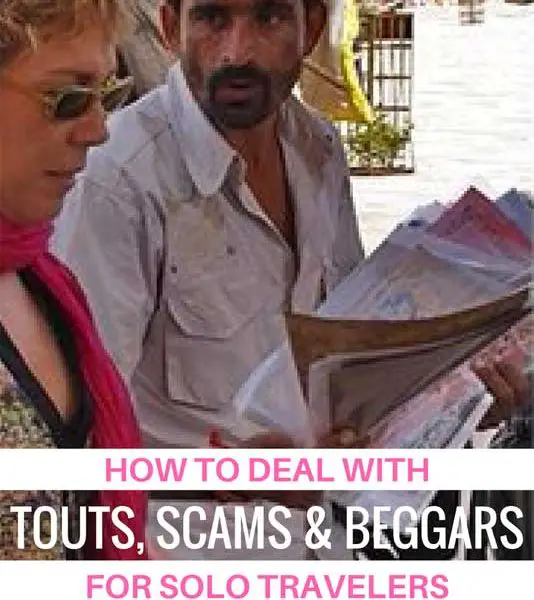
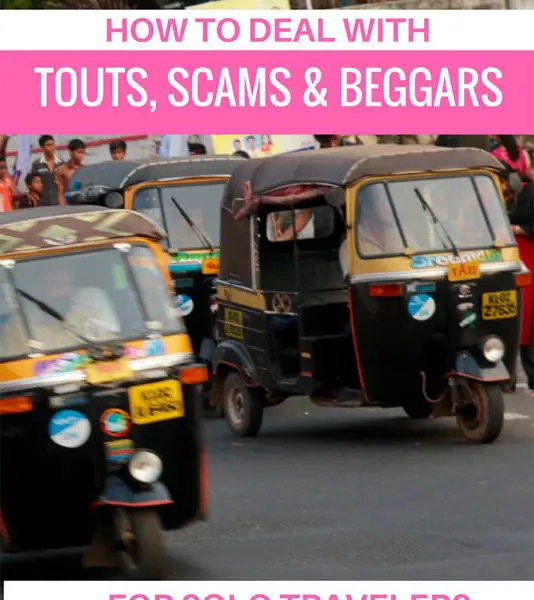
Looking for travel insurance?
American travelers often pay a premium on travel insurance. World Nomads offers economic solutions for travelers who seek security and peace of mind. It covers 150 countries.
Disclosure: Some of the links in this post are “affiliate links.” This means if you click on the link and purchase the item, I will receive an affiliate commission. Regardless, I only recommend products or services I use personally and believe will add value to my readers.





